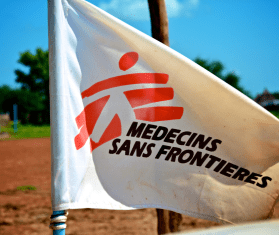As of today, 246,000 people who fled from the Vanni remain inside camps in the Vavuniya district and there are concerns about the future situation with the coming monsoon despite the ongoing effort mobilized.
Regarding health-care provision, the Sri Lankan Ministry of Health have mobilized significant resources from all over the country to provide health care in the camps; deploying doctors and nurses in 24 health structures, and therefore considers MSF medical assistance in the camps unnecessary. Some primary health care facilities have been set up in camp zones and a referral system has been implemented gradually since February. MSF teams are currently working in three hospitals outside the camps
The authorities have upgraded and reinforced Cheddikulam hospital, which receives many displaced patients in need of secondary health care (mostly maternity and paediatric care) while Vavuniya General Hospital is the referral center for the most complicated cases.
Some patients are transferred to the MSF hospital outside Menik Farm, close to the camps. In August, 874 new admissions were registered there, twice the average of previous months. Now equipped with a radiology department and laboratory, the MSF hospital has developed a wide range of services: surgery, maternity, paediatric, and internal medicine with infectious diseases, a traumatology-orthopedic unit and outpatient consultations. The capacity is currently 160 beds and can be extended.
The MSF surgical team does on average 10 interventions per day, mostly minor non-urgent surgery. “Almost four months after the end of the fighting, what the surgeons can do is mainly to reduce the functional disability of the patient. Many of our patients need orthopaedic reconstructive surgery”, explains Dr. Mego Terzian, MSF deputy desk manager. A number of patients still have wounds from the conflict, and others suffer from respiratory and skin infections. Suspected typhoid fever represented more than one in ten admissions in August in the MSF hospital. “We have to be prepared for the beginning of the monsoon” explains Dr. Terzian. “It can be expected that with the rains we will see a rise in the number of diarrhea cases or other waterborne diseases.”
Two of the Ministry of Health hospitals, Vavuniya General Hospital and Pompaimadu Hospital, are supported by MSF with extra human resources and some equipment.
There are currently around 700 patients in the Vavuniya General Hospital and the Joint MoH and MSF surgical teams performed 162 surgeries, 141 of them major, in the last week of August. The authorities have appointed a new orthopedic surgeon and MSF is looking forward to extend its support in reconstructive surgery.
Pompaimadhu Hospital has nearly 200 patients, 170 of them post-operative. There are 62 people with spinal cord injuries who receive physiotherapy, and caretakers continue to assist patients with everyday activities like bedside care and changing dressings. MSF is currently developing a program jointly with the health authorities to focus on early rehabilitation for these patients.
However, despite significant effort, the needs of a population trapped in conflict for so many years remain substantial and concerning. MSF is ready to scale up its activities to assist the Ministry of Health in their efforts to provide quality health care in the camps and during the resettlement process.



